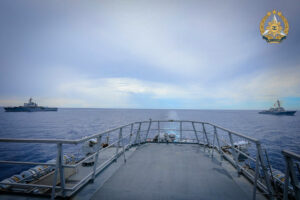By Kenneth Christiane L. Basilio, Reporter
THE Philippines held joint naval drills with Japan and the US in the South China Sea on Sept. 12 and 13, signaling a growing trilateral partnership in response to increasing maritime tensions in the South China Sea.
In a statement on Sunday, the Armed Forces of the Philippines (AFP) said the Philippine frigate BRP Jose Rizal, US destroyer USS John Finn and Japanese landing ship JS Osumi held anti-submarine warfare drills off the coast of Zambales province, which faces Scarborough Shoal, one of the most volatile flashpoints in the sea dispute between Manila and Beijing.
The joint activity took place in the waters off Magalawa Island, Palauig to Silanguin Island in San Antonio, Zambales.
Four Philippine Air Force FA-50 jets, a US maritime patrol and surveillance aircraft and several helicopters also joined in the exercises that also involved surface warfare maneuver drills, it added.
“The successful conduct of the multilateral maritime cooperative activity not only enhances the interoperability of the participating forces but also reaffirms the Philippines’ steadfast commitment to safeguard its maritime interests and upholding peace and security in the region,” the AFP said.
Manila’s sea drills with its close allies Tokyo and Washington came on the heels of China’s plan to build a nature reserve in the Scarborough Shoal, which is within the Philippines’ exclusive economic zone and is located about 120 nautical miles (222 kilometers) off Zambales.
China’s military held routine patrols in the South China Sea on Sunday, Reuters reported, in a seeming response to the trilateral sea drills by the Philippines and its allies. It also warned the Philippines of raising tensions in the disputed waters.
“We sternly warn the Philippine side to immediately stop provoking incidents and escalating tensions in the South China Sea, as well as bringing in external forces for backing such efforts that are destined to be futile,” a spokesperson for the Chinese military’s Southern Theater Command said. “Any attempt to stir up trouble or disrupt the situation will not succeed.”
The two countries have been engaged in a long-running maritime standoff in the strategic waterway that has included regular clashes between coast guard ships and massive naval exercises.
The South China Sea has become a regional flashpoint as Beijing continues to assert sovereignty over almost the entire sea, a vital global trade route that is believed to be rich in undersea and oil deposits.
In a separate statement, the US Indo-Pacific Command said Japan, the drills were meant to strengthen regional cooperation and support a free and open Indo-Pacific region.
The Philippines has increasingly leaned on multinational cooperation to shore up its maritime capabilities and boost interoperability with its allies in the waters fraught with tension.
Rear Admiral Roy Vincent T. Trinidad, Philippine Navy spokesman for the South China Sea, said in August that Chinese activity typically dials back in the presence of foreign navies during joint maritime drills.
“Maritime cooperative activities are conducted in a manner consistent with international law and with due regard to the safety, navigational and freedoms of all nations,” the US Indo-Pacific Command said.
“The US, along with our allies and partners, upholds the right to freedom of navigation and overflight and other lawful uses of the sea and international airspace, as well as the respect to the maritime rights under international law,” it added.
Manila and Washington are close allies, and their security ties are anchored on a 1951 Mutual Defense Treaty that obligates both nations to come into the aid of each other in case of an attack in the Pacific region, including the South China Sea.
Security cooperation with allies have been boosted under President Ferdinand R. Marcos, Jr., who has taken a firmer stance against Beijing’s sweeping maritime claims compared with his predecessor.
A Hague-based arbitral tribunal voided China’s sweeping South China Sea claims in 2016, but Beijing has ignored the ruling.
